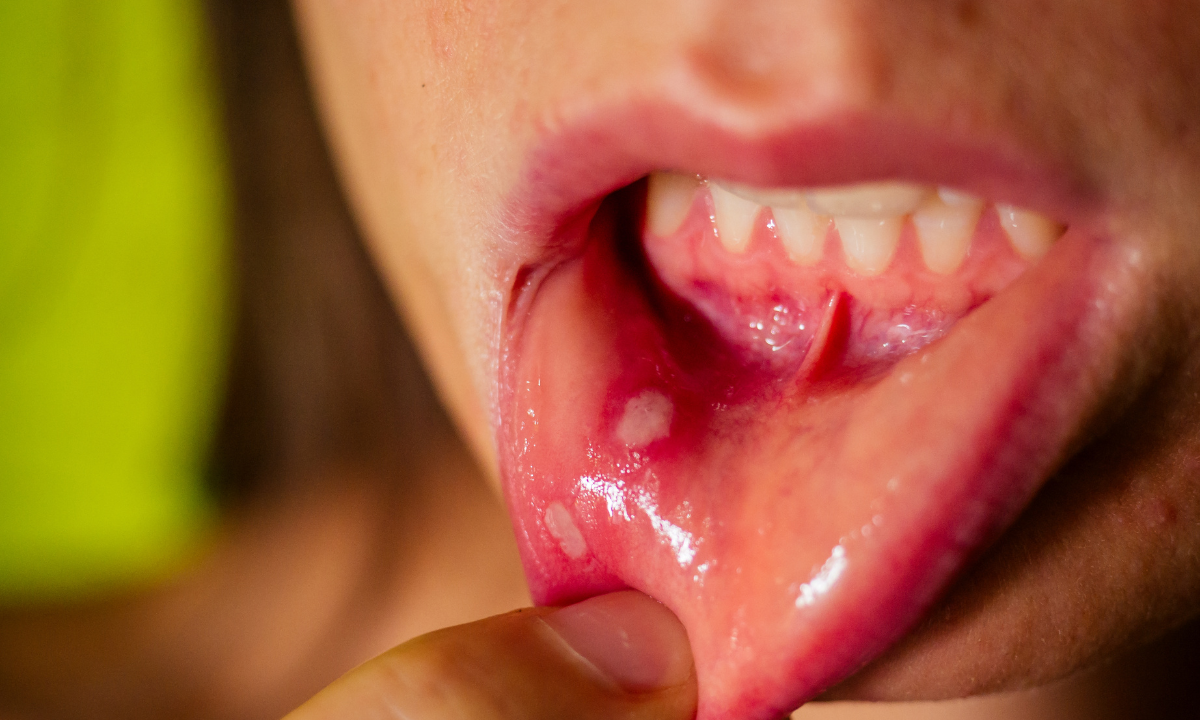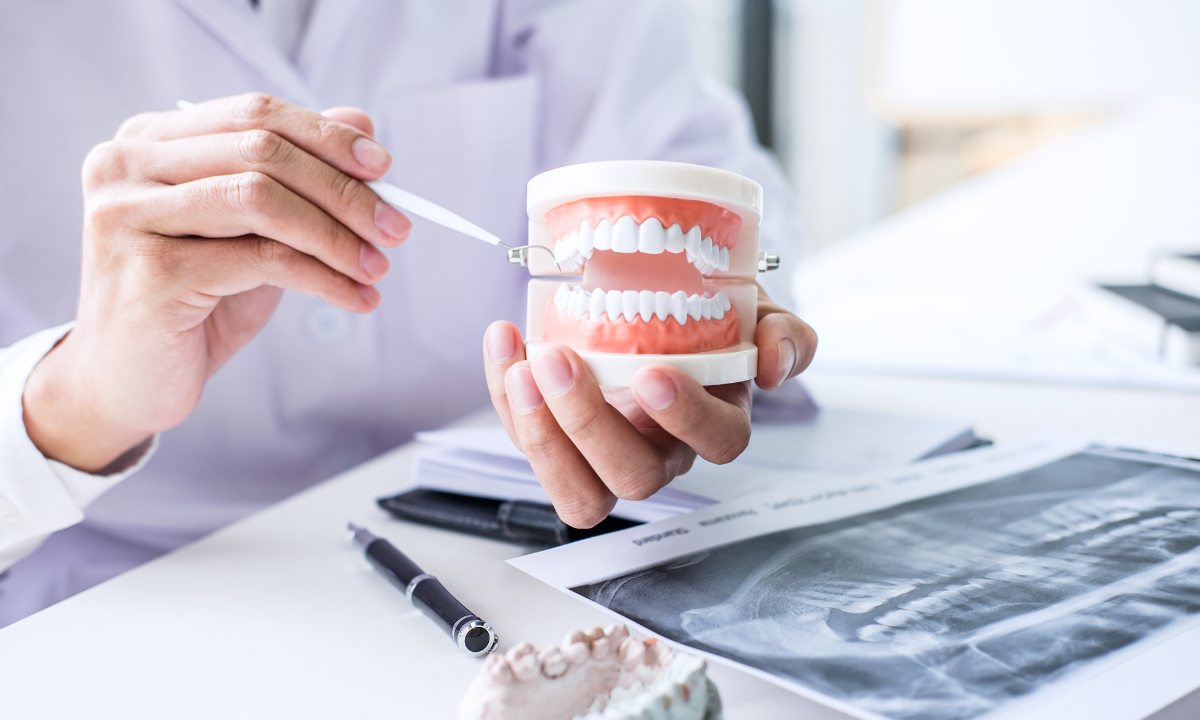You may have heard of HIV-related mouth sores if you have human immunodeficiency virus (HIV) or are taking care of someone who does. These painful and uncomfortable sores form around the mouth and are commonly caused by a weak immune system. Anyone can get sores in their mouth, but people with HIV are more likely to get them, and these sores are usually worse, more frequent, and harder to heal.
Understanding what HIV mouth sores are, their causes, early symptoms, and how to manage or prevent them can help reduce complications and support better oral health for people living with HIV.
What are HIV mouth sores?
HIV mouth sores are painful lesions, ulcers, or patches that develop in or around the mouth. They can appear on the tongue, gums, inside the cheeks, roof of the mouth, or lips.
People with HIV experience these sores more frequently and severely because the virus weakens the immune system. Some common causes include:
Opportunistic infections:
These are infections that happen when bacteria, fungi, or viruses take advantage of a weak immune system.
Sexually transmitted infections (STIs):
Oral sex can spread STIs like syphilis and gonorrhoea, which can cause sores in the mouth.
Side effects from HIV treatments or other medications:
Certain medications, including HIV drugs, can make your mouth dry and cause other oral issues, which lead to sores.
Inflammatory or autoimmune conditions:
Conditions that cause inflammation also occur as lesions in the mouth.
When do HIV mouth sores appear?
The timing of when these sores appear can vary for each individual, depending on the stage of infection and overall immune health. Some people notice them early on, while others may not experience any until the later stages.
Early stage (acute HIV):
The sores can appear within weeks of exposure to HIV.
Later stages (chronic HIV or AIDS):
The sores can become more common and severe, as the immune system has significantly worsened by this stage.
Triggers:
They can also appear during times of stress, illness, or immune suppression.
If you notice persistent or painful mouth sores, don’t wait! Book an appointment with Thomson Medical today to receive evaluation and care tailored to your needs.
What do mouth sores look like?

The characteristics of the sores can be different depending on the underlying causes and immune status. They can appear as:
Red or white patches
Painful ulcers
Blisters or raised lumps
Flat or raised dark lesions (in cancerous conditions)
Can affect tongue, cheeks, gums, lips, roof of the mouth, or throat
Sores inside your mouth
Several types of sores can develop inside the mouth in people living with HIV. Below are the most common ones, along with how to recognise them.
Canker sores (aphthous ulcers)
A canker sore, also known as an aphthous ulcer, is a tiny and painful sore that forms inside the mouth, commonly on your tongue, gums, or the inner parts of your cheeks and lips.
Small, round, or oval ulcers with white or yellow centers and red edges
Painful but not contagious
Common triggers include:
Stress
Injury
Immune changes
The healing time depends on the severity of your canker sores. Minor sores take a few weeks to recover without scarring, while major ones can take months to heal and often leave scars.
Oral hairy leukoplakia
Oral hairy leukoplakia (OHL) is a harmless white, corrugated and hairy-looking patch that forms on the sides of your tongue. The infection is caused by the Epstein-Barr virus (EBV) and varies in size and shape. However, many patients usually witness these symptoms:
White, “hairy” patches on the sides of the tongue
Painless but can be irritated after consuming spicy or hot foods
Cannot be scraped off or cleaned with water
The spots can grow thicker and harder over the course of a few weeks or even months.
Thrush (oral candidiasis)
Thrush, or oral candidiasis, is a common fungal infection caused by an overgrowth of Candida yeast. The condition generally does not pose any serious harm; however, if your immune system becomes weakened, it can cause more severe or persistent symptoms.
Thick, creamy white, and sometimes painful patches
Appears on the tongue, inner cheeks, throat, or other areas of the mouth
May cause burning, redness, and bleeding if scraped
Loss of taste
HPV-related oral warts
Human papillomavirus (HPV) is one of the most common STIs, and for HIV patients, it is more likely to occur and persist. HPV can be spread through oral or sexual contact, leading to visible warts or lesions on affected areas, including the mouth and throat.
HPV-related oral warts usually exhibit these traits:
Flesh-colored, bumpy warts inside the lips, cheeks, or throat
Sore throat and difficulty swallowing
Contagious, and some strains can increase the risk of throat cancer
Often painless but can be persistent
Syphilis
Syphilis is a common infection caused by Treponema pallidum bacteria. The disease is mostly transmitted through unsafe sexual contact.
In the mouth, syphilis may cause:
Painless sores (chancres) inside the mouth, on the tongue, or in the throat
Can heal on their own with early screening and proper treatment
May be accompanied by rash or flu-like symptoms later if untreated
Gonorrhoea
Gonorrhoea is a common STI caused by Neisseria gonorrhoeae bacteria. Anyone can contract gonorrhoea, particularly individuals aged 15 to 24 years old who engage in unprotected sexual practices.
The symptoms vary depending on your immunity and can include the following characteristics:
Small ulcers or red spots in the mouth or throat
White or yellow patches on the tonsils
Sore throat with swelling and itching
Bad breath
Rare but possible through oral sex
Gum disease and dry mouth
People living with HIV are more prone to gum disease and dry mouth due to weakened immunity and side effects of certain medications.
Gingivitis:
Red, swollen gums that bleed easily
Periodontitis:
Severe gum infections that can lead to tooth loss, bone loss, and other oral health issues
Dry mouth (xerostomia):
Can cause ulcers, decay, and infections
Sores on or near your mouth

Some sores develop around the lips or outside the mouth, especially when immunity is low. This not only causes health problems but can also affect your appearance and confidence, as they are mostly visible warts or lesions.
Oral herpes
If you see cold sores or blisters on or around your lips, herpes may be the cause. Oral herpes is commonly transmitted through oral sex or kissing with an infected individual.
Painful, fluid-filled blisters or cold sores on lips or mouth
Can recur frequently in people with HIV
Kaposi sarcoma (KS)
This type of sore is less common but more serious, linked to advanced HIV or AIDS
Dark red, purple, or brown flat or raised lesions
Found on gums, tongue, or roof of the mouth
Caused by Human Herpesvirus 8 (HHV-8)
Common in people with AIDS or advanced HIV
How is it diagnosed?
Your healthcare provider may perform one or more of the following:
Visual oral exam:
To identify common mouth infections or visible abnormalities.
Swab tests:
Used to detect viruses or fungi such as HSV or Candida.
Biopsy:
Used for persistent, unusual, or suspicious lesions to rule out serious conditions.
Blood tests:
Conducted to check for STIs, such as syphilis or gonorrhoea.
HIV testing:
If your status is unknown or unconfirmed, your provider may suggest HIV screening to evaluate immune health.
If you notice unusual sores or lesions in your mouth, don’t try to self-diagnose. Different mouth infections can look similar, so a medical exam is the best way to know what’s happening. You can schedule a check-up with Thomson Medical if you’d like guidance or reassurance from our doctor.
Is there a treatment for it?

Yes, most HIV-related mouth sores can be treated effectively once the cause is identified. Treatment usually involves addressing both the infection and the underlying immune issue.
Condition | Recommended treatment |
Canker sores |
|
Thrush (candida) |
|
Oral warts (HPV) |
|
Herpes (HSV) |
|
Syphilis / gonorrhea |
|
Kaposi sarcoma |
|
Gum disease |
|
ART remains the foundation of treatment. By restoring immune strength, ART helps prevent future sores and supports faster healing.
Our sexual health specialists
Loading...
FAQ
Are HIV mouth sores contagious?
Whether HIV mouth sores are infectious depends on the underlying causes.
Contagious when caused by herpes, HPV, syphilis, and gonorrhoea.
Not contagious when caused by canker sores or thrush.
However, to reduce risk and protect your health, it’s best to refrain from kissing, sharing utensils, or oral contact when the sores are open or active.
Do mouth sores mean I have HIV?
Mouth sores do not necessarily mean you are infected with HIV. Stress, vitamin deficiency, or other risk factors can trigger mouth sores. However, chronic or severe sores might signal immune weakness or an underlying infection like HIV, so testing is recommended if you’re at risk.
Can HIV treatment help with mouth sores?
Yes. ART can help boost your immune function and reduce outbreaks and the severity of mouth lesions.
Can HIV be diagnosed from a mouth sore alone?
No. Even though many people living with HIV encounter mouth sores, they cannot be used to diagnose HIV. Only a blood test can confirm the infection. Mouth sores may serve as a clue, but not a definitive sign.
How can I prevent HIV-related mouth sores?
A few consistent habits can make a big difference in prevention. Here’s what you can do:
Take ART regularly
Maintain good oral hygiene
Avoid smoking and alcohol
Stay hydrated
Eat a balanced diet
Treat infections promptly
Are HIV mouth sores painful?
Yes, HIV mouth sores can be painful. They often appear as red, white, or yellow ulcers inside the mouth, on the tongue, gums, or lips. These sores can make eating, swallowing, or talking uncomfortable.
The information provided is intended for general guidance only and should not be considered medical advice. For personalised recommendations and tailored advice based on your unique situations, please consult a specialist at Thomson Medical. Request an appointment with Thomson Medical today.
For more information, contact us:
Thomson Specialists (Women's Health)
Thomson Women's Clinic (TWC)
- Novena:
6592 6686 (Call), 8611 8986 (WA) - Bukit Batok:
6569 0668 (Call), 8686 3525 (WA) - Choa Chu Kang:
6893 1227 (Call), 8282 1796 (WA) Jurong:
6262 8588 (Call), 6262 8588 (WA)- Katong (female doctor):
6970 2272 (Call), 8611 9020 (WA) - Punggol:
6243 6843 (Call), 8811 0328 (WA) - Sembawang: 6753 5228
- Sengkang: 6388 8125
- Serangoon (female doctor): 6382 3313
- Tampines: 6857 6266
- Tiong Bahru: 6276 1525
